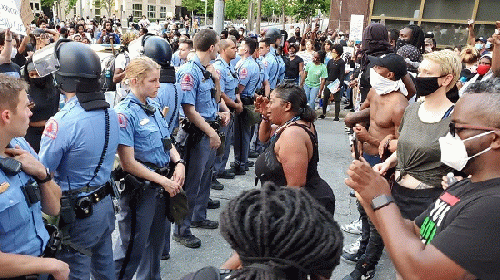
The dehumanisation that enabled Floyd's murder has been regularly on view in the occupied Palestinian territories
(Image by npr.org) Details DMCA
A video that went viral late last month of a Minneapolis police officer, Derek Chauvin, killing a black man, George Floyd, by pressing a knee into his neck for nearly nine minutes has triggered a fortnight of mass protests across the US - and beyond.
The footage was the latest disturbing visual evidence of a US police culture that appears to treat Black Americans as an enemy - and a reminder that rogue police officers are all too rarely punished.
Floyd's lynching by Chauvin as three other officers either looked on, or participated, has echoes of troubling scenes familiar from the occupied territories. Videos of Israeli soldiers, police and armed settlers beating, shooting and abusing Palestinian men, women and children have long been a staple of social media.
The dehumanisation that enabled Floyd's murder has been regularly on view in the occupied Palestinian territories. In early 2018 Israeli snipers began using Palestinians, including children, nurses, journalists and the disabled, as little more than target practice during weekly protests at a perimeter fence around Gaza imprisoning them.
Widespread impunityAnd just as in the US, the use of violence by Israeli police and soldiers against Palestinians rarely leads to prosecutions, let alone convictions.
A few days after Floyd's killing, an autistic Palestinian man, Iyad Hallaq - who had a mental age of six, according to his family - was shot seven times by police in Jerusalem. None of the officers has been arrested.
Faced with embarrassing international attention in the wake of Floyd's murder, Israeli Prime Minister Benjamin Netanyahu made a rare statement on the killing of a Palestinian by the security services. He called Hallaq's murder "a tragedy" and promised an investigation.
The two killings, days apart, have underscored why the slogans "Black Lives Matter" and "Palestinian Lives Matter" sit naturally alongside each other, whether at protests or in social media posts.
There are differences between the two cases, of course. Nowadays Black Americans have citizenship, most can vote (if they can reach a polling station), laws are no longer explicitly racist, and they have access to the same courts - if not always the same justice - as the white population.
That is not the situation for most Palestinians under Israeli rule. They live under occupation by a foreign army, arbitrary military orders govern their lives, and they have very limited access to any kind of meaningful legal redress.
And there is another obvious difference. Floyd's murder has shocked many white Americans into joining the protests. Hallaq's murder, by contrast, has been ignored by the vast majority of Israelis, apparently accepted once again as the price of maintaining the occupation.
Treated like an enemyNonetheless, comparisons between the two racist policing cultures are worth highlighting. Both spring from a worldview shaped by settler-colonial societies founded on dispossession, segregation and exploitation.
Israel still largely views Palestinians as an enemy that needs to be either expelled or made to submit. Black Americans, meanwhile, live with the legacy of a racist white culture that until not so long ago justified slavery and apartheid.
Palestinians and Black Americans have long had their dignity looted; their lives too often are considered cheap.
Sadly, most Israeli Jews are in deep denial about the racist ideology that underpins their major institutions, including the security services. Tiny numbers protest in solidarity with Palestinians, and those that do are widely seen by the rest of the Israeli public as traitors.
(Note: You can view every article as one long page if you sign up as an Advocate Member, or higher).





